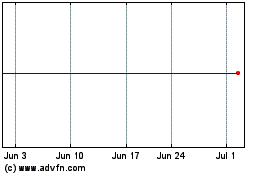Tech Giants Pledge Fight Against Online Child Exploitation
March 05 2020 - 6:00PM
Dow Jones News
By Robert McMillan and Sadie Gurman
Representatives from law enforcement and the technology industry
pledged to step up their fight against child sexual abuse on the
internet, but remained at odds over government concerns about
misuses of the encryption technology deployed by some
companies.
U.S. Attorney General William Barr on Thursday said six major
technology companies had agreed to a set of voluntary principles
that would guide their approach to fighting online sexual
exploitation of children.
The technology companies have agreed to a series of high-level
principles that will govern the way they police online content --
ideas such as focusing their efforts on areas that have been
difficult to monitor, such as live streaming, and taking into
account solutions proposed by victims. Facebook Inc., Alphabet
Inc.'s Google, Microsoft Corp., Snap Inc. and Twitter Inc., as well
as the online gaming hub Roblox Corp., have been developing these
principals since July, the Justice Department said.
But Mr. Barr and some of the U.S.'s closest international
intelligence-sharing partners -- a group known as the Five Eyes --
remain concerned that encryption technology, particularly
Facebook's plans to add end-to-end messaging encryption, could
leave them in the dark. Some members of that group last year
already voiced their concerns about the spreading private-sector
use of such technology.
"Encryption remains the elephant in the room," James
Brokenshire, a minister with the U.K.'s Home Office, said Thursday
in Washington. "Last year Facebook identified around 12 million
incidents of child sexual exploitation abuse on Messenger --
something that I absolutely commend them for doing -- yet plans to
encrypt this service would leave you blind to the same crimes."
Facebook, meanwhile, reiterated its concern that any government
efforts to roll back encryption would undermine the security of its
products. "We believe companies and governments can work together
to keep children safe online while still protecting people's
privacy and continuing to secure their messages with encryption," a
company spokesman said via email.
Mr. Barr has also rebuked Apple Inc. less than two months ago
for its encryption and other digital security measures when he
escalated pressure on the company to open a pair of iPhones
belonging to an aviation student from Saudi Arabia who authorities
say killed three people at a Florida Navy base late last year.
Mr. Barr has shown a willingness to confront tech companies in a
way that has concerned even some like-minded Federal Bureau of
Investigation officials who fear it could hurt the relationships
they have built with Silicon Valley.
Yet Mr. Barr, speaking at the press event Thursday where
officials declined to answer questions, appeared to soften his
tone. He again lamented suspects' ability to communicate through
"virtually unbreakable encryption," saying "predators' supposed
privacy interests should not outweigh our children's privacy and
security; there's too much at stake." But, he added that he was
heartened that companies had signed onto the principles.
Four years ago, the Justice Department launched a legal fight
against Apple, looking to compel the iPhone maker into granting it
access to the mobile phone used by one of the San Bernardino,
Calif., terror suspects. Government officials ultimately backed
down after a private firm found a way to access the phone.
Apple wasn't named in Thursday's announcement, but a company
spokesman said it endorses the principles.
In addition to Mr. Barr's statements, U.S. Senators Lindsey
Graham, a Republican from South Carolina, and Democrat Richard
Blumenthal of Connecticut have proposed legislation that could
pressure tech companies into providing law-enforcement access to
these systems.
Apple, like Facebook, has previously said that any system that
would grant such access would undermine the security of their
products and create opportunities for criminals and authoritarian
governments to improperly access user data.
Write to Robert McMillan at Robert.Mcmillan@wsj.com and Sadie
Gurman at sadie.gurman@wsj.com
(END) Dow Jones Newswires
March 05, 2020 17:45 ET (22:45 GMT)
Copyright (c) 2020 Dow Jones & Company, Inc.
Twitter (NYSE:TWTR)
Historical Stock Chart
From Mar 2024 to Apr 2024

Twitter (NYSE:TWTR)
Historical Stock Chart
From Apr 2023 to Apr 2024
